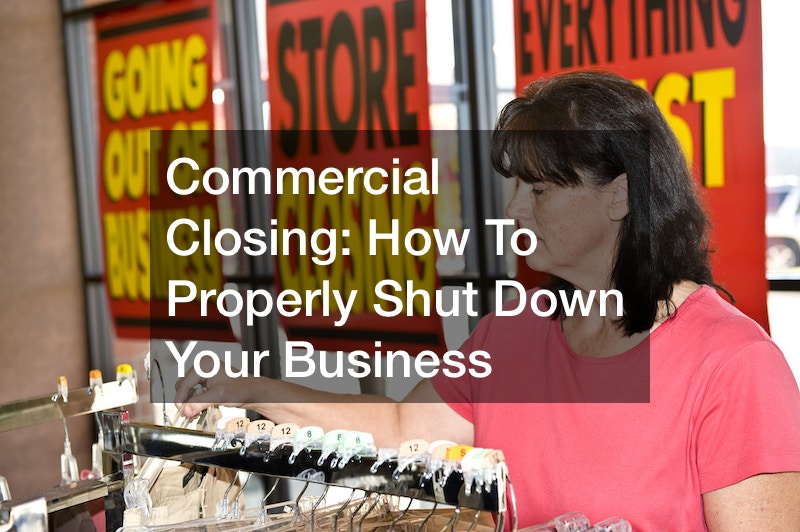Remember when you started your business, all the hopes and dreams you wished to achieve? Unfortunately, not all businesses get to live out their dreams; unforeseen circumstances often force them to shut down. As devastating as it can be to think about commercial closing when your business isn’t making enough money to cover its expenses, it makes no financial sense to continue having your doors open. It’s time to shut down.
Shutting down a business is, however, not a walk in the park; you must carefully think through the process and analyze the risk of becoming liable for any debts the company owes. Therefore, don’t rush through the process. Les Roberts says it takes at least three months to shut down a business correctly. If yours is in this predicament, below is a guide on properly shutting it down.
Make the Decision to Shut Down
You may have done all you could to save your business in vain. To shut it down, your first step should be to have an honest, in-depth look at your business and acknowledge that you can’t do more. Some red flags indicating that it’s time to shut down include; when you start using your credit cards to reduce office expenses, when you start losing some of your best employees, and when the pressure from work puts your health at risk. If you are the sole proprietor in your business, deciding to shut down can go a lot quicker than in a partnership. If you don’t know how to go about the commercial closing process, you can contact local business attorneys to take you through the options.
Plan a Shut Down Strategy

Now that you’ve made the tough decision of shutting down your business, it’s time to lay down your strategy by coming up with a plan listing all the things you need to do before making the commercial closing official. Among items to include in your to-do list are; rentals and leases, tax requirements, and supplier and customer accounts, to name just a few. So that you don’t miss anything, refer to your original business plan. The shutdown process can be overwhelming for any business person; therefore, seeking professional help from lawyers, brokers, accountants, and other business specialists is important.
Consider Bankruptcy
Bankruptcy is one of the most avoided words in the English dictionary; consequently, every business person wishes to have an easy commercial closing that doesn’t require filing for bankruptcy. However, this does not always happen, and when push comes to shove, the most viable option is to seek bankruptcy service. Of course, this is after you’ve ruled out all other possible options.
The truth is, filing for bankruptcy eases the pressure from your debts and other bill collectors. However, it comes at a cost. Depending on the laws of the land and the type of bankruptcy you’re filing for, you may spend as little as a few hundred or several thousand dollars to get debt relief. You will need legal assistance from bankruptcy attorneys who will walk you through the process.
Notify Your Staff

Your staff has been there with you as you worked towards achieving the vision you had for your business. Therefore, it’s only right that you treat them with the respect and dignity they deserve. While shutting down your business is agonizing enough for you, it’s tougher for people who rely on it to care for their families.
It’s one thing to admit to yourself that the business is failing, and it’s another to let other people know. This is where it gets too real. With the closure of a business, someone gets laid off, and a family loses a livelihood. It means forgone income already budgeted for; the pain is only too hard to imagine. But of course, you already know this, and just thinking about it is agonizing. It’s the only option left.
Letting your staff know about the commercial closing is inevitable; the last thing you want is for them to get the news from other people. First, you’ll need to give them an explanation as to why the business is shutting down, and since you’ll have to lay them off, you must comply with labor and employment laws by making all necessary payments. In addition, you could contact corporate catering companies and organize an intimate farewell party for the staff as a sign of your appreciation for their service.
Collect Outstanding Receivables
Collecting your account receivables will be much harder when news of your commercial closing goes public. Businesses that may be owing you money may not prioritize paying a debt to you, an individual, as they would a business. Therefore, devise a more aggressive strategy to collect all monies owed before announcing the shutdown. One of the strategies you could use to ensure you get paid is offering discounts to debtors who make immediate payments. Of course, this means losing some money, but it’s better to have some back than none. The cash you collect will come in handy as you prepare to close.
Notify Creditors and Pay your Debts

As you shut down your business, you don’t want to burn bridges. Therefore, pay your lenders what you owe them, including suppliers and vendors working with you. Commercial laws govern how you pay your debts during a commercial closing. However, you’ll need to be intentional about when to notify unsecured suppliers and creditors so you can continue receiving all the necessary supplies until the official close of business.
If your business has taken a loan with a bank, be careful about when to notify them about your intention to shut down. In some cases, a bank may not trust that you can pay the loan after shutting down; hence they may decide to deduct their loan from your business account without notifying you.
Sell your Business Assets
You have accumulated so much debt because you didn’t have enough money to make payments. Therefore, selling excess inventory in your books will give you the money you need to clear your outstanding debts. If your stock isn’t too much, try selling it at a discounted price to friends and family or advertise it on a commercial website. However, if you have a warehouse full of inventory, contact an inventory liquidator who will buy all your excess inventory and help you sell it through different channels.
File Articles of Dissolution
This is the first legal step toward a commercial closing. You’ll need to file articles of dissolution in every state your business is registered in. This is critical as it protects you from individual liability for business debt and continued taxes. The rules for filling articles of dissolution differ from state to state; therefore, you’ll need to seek the advice of a professional who will guide you on the rules for filling in your specific state. One state may require you to clear your debts before dissolution, while another may need you to first file for dissolution.
Inform Your Customers and Complete All Jobs That Are In Progress
This is another nerve-racking step that makes the commercial closing process daunting, but just like the other steps, it has to be done. As much as the shutdown is difficult for you, your customers are affected too. Therefore, notify them about the intention of closing at a good time so they can make the necessary arrangements. Depending on the size of your customer base, there are different ways in which you can inform them. For example, you may go public in the dailies, do a press release, send emails, or post on the business’s social media platforms. The final decision isn’t going to be easy, but it has to be done, and you’re up to the task!
Besides notifying your customers, ensure all outstanding jobs or jobs in progress are done and completed before the shutdown. Some of the contracts you signed with your customers may have a provision for cancellation where you’ll be required to pay an agreed amount if you can’t do the job. Honestly, paying or refunding your customers, in this case, is the easier way out. However, if you can’t pay, your only option is to complete all the pending work.
Hand in Your Final Payroll Forms and File Taxes

Of all the debts you may owe, your tax obligations are the most important, and you’re well advised to prioritize them. Failure to pay your taxes may lead to devastating consequences since you’re personally liable for paying payroll taxes. That’s if you haven’t filed for bankruptcy.
Governments have extraordinary powers they can use to collect taxes. Therefore, to be safe, deposit your tax and file all your payroll taxes quickly. If at the time you owe the IRS more than you can afford to pay them at the time, there’s a chance to negotiate for a reduction of taxes; but if you’ve already filed for bankruptcy, this option isn’t available for you.
File state sales taxes until the official closing date. Afterward, you’ll need to consult a professional to guide you on closing your tax account. The IRS has different requirements for filing the final income tax depending on whether your business is a partnership, sole proprietorship, or corporation.
Cancel All Business Licenses and Permits
Businesses must have licenses and permits to operate. Therefore, when you finally decide to have a commercial closing, notify the federal, state, county, or local government that issued you the licenses and permits about your intentions to shut down. This way, you’re not liable for renewal fees or taxes after the close of business. Another reason you shouldn’t skip this step is that it helps trademark your business name so that malicious people won’t use it.
Terminate Your Commercial Lease
Whenever you terminate a lease, commercial or not, you should know when it will end and when you intend to move out. If you choose to leave at the end of your lease, check your agreement to see when and how you’re expected to hand in your notice. According to Pattie Whiting, most landlords require at least one month’s notice before moving out. On the contrary, if you break the lease, the process is a bit tougher. Therefore, carefully review your lease agreement to decide the best time to move.
Once your landlord agrees, you can move out and start sourcing for local truck rental companies to help ferry your belongings to your desired location. After packing up your office in boxes, there may be clutter and commercial waste you don’t wish to carry with you. You may need to hire trash removal companies who’ll bring their commercial recycling containers to pack you up.
Take Care of All Necessary Repairs
Hiring a housing inspector to assess the building is important before moving into a space. The housing inspector will write a report documenting the condition of the building before you move in. After that, the landlord is issued a copy of the report and given a chance to make repairs, if any. This ensures you’re delighted with the condition of the building before signing the lease.
Similarly, when you decide to move out at the end of the lease, there will be an inspection to ensure you leave the space in the same condition you found it. If repairs are needed, you may be required to take care of them before breaking or discontinuing your lease agreement. Some of the services you may need to hire include air conditioning services, and electrical services. Contact a local asphalt repair company for service if there is damaged pavement.
Keep All Documentation
Keeping your records safe when running a business and when it’s time for a commercial closing is important. These are the documents you use as evidence to show everything was done by the book. Some records you should file and keep safely include all employment and tax information.
With that done, it’s now official! Your business has been successfully dissolved. Depending on your reason for closure, this can be a bittersweet moment. You were used to waking up to a fully planned day, and now there’s nothing left to do. Take time to moan if you need to. After that, get up and carry on with your life. Timothy Carter noted that 50 percent of businesses fail within the first five years. You are not alone, and the good news is that you’ll rise again!


